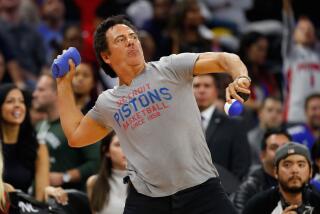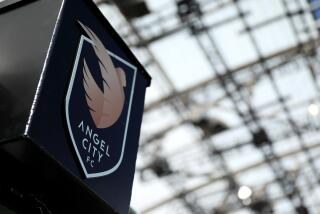Carl’s Jr. Deal Expected to End Karcher’s Control : Business: Founder may get ceremonial role. Investor group’s acquisition will help him restructure personal debt.
- Share via
ANAHEIM — In a complicated transaction expected to be announced today, Carl N. Karcher will formally give up control of the Carl’s Jr. restaurant chain he founded 52 years ago as a single hot dog stand.
Sources said the Orange County investor group that will hold the major stake in Carl Karcher Enterprises hopes to persuade the board to allow Karcher, 76, to return to the management team, possibly in the largely ceremonial role of chairman emeritus. The board ousted Karcher as chairman Oct. 1.
The deal--to be completed later this month--is aimed at helping Karcher resolve his most troublesome financial difficulties while allowing him to maintain some presence at the company he helped promote as a colorful TV pitchman.
The deal also could finally help the hamburger chain puts its bitter management feud behind it and focus on regaining market share lost to giant national fast-food companies.
Karcher would not comment Tuesday night on the deal. “I find that I put my foot in my mouth and catch trouble from (attorneys) if I talk about these things,” Karcher said in a telephone interview.
The Orange County investors seem to support efforts by new management--moves objected to by Karcher--to follow the lead of other fast-food companies in offering lower-cost items, revamped menus and advertising to attract patrons and reverse a revenue slump.
But the chain’s prices are still higher than those of competitors, a key issue for many consumers in a sluggish economy.
Under the deal, a limited partnership led by title industry executive William P. Foley II has agreed to help Karcher restructure a delinquent personal loan from Union Bank that has grown to nearly $26 million with interest and fees, sources close to the deal said Tuesday.
The loan, for which Karcher pledged 3.9 million Karcher Enterprises shares as collateral, is threatening to wreck Karcher’s personal finances.
In return for financial help, Karcher would turn over the 3.9 million shares--22% of the company’s stock--to the group, in which he would be a limited partner. The shares would be used as collateral for financing needed to restructure the Union Bank loan. The partnership would also use securities that it holds in other companies as collateral.
The shares, when coupled with those already owned by Karcher, Foley and other investors associated with Foley, would give the group control of more than 34%--the largest single block--of Karcher Enterprises stock.
Karcher would end up with about 1 million shares outright, about 5.5% of the total.
Sources said that Foley, as general partner, would vote the partnership’s shares as a block. Foley and at least one other investor, Ron Lane, also are expected to seek seats on Karcher Enterprises’ board.
Foley, an acquaintance of Karcher, has been working since October to help rescue the fast-food mogul from his financial difficulties. Karcher has been stung by failed real estate ventures in Southern California, the shrinking value of his Karcher Enterprises stock and ill-advised investments in a handful of troubled companies.
Foley would not comment on the deal or on his plans once the debt restructuring is completed. But in the past, Foley, who is chairman of Fidelity National Financial in Irvine, has described his role at Karcher Enterprises as that of a mediator interested in boosting the company’s stock price.
It was uncertain Tuesday whether the transaction would soften Karcher’s feud with longtime board members and current Karcher Enterprises President Donald E. Doyle over the company’s strategic direction. The board replaced Karcher as company chairman with board member Elizabeth A. Sanders after Karcher demanded that Sanders and directors Daniel Holden and Peter Churm resign.
Sales at the 650 Carl’s Jr. restaurants have been falling for nearly four years. The company is experimenting with a new, value-oriented menu that features items more in keeping with the public’s demand for good-tasting food that is generally less expensive than the fare at Carl’s Jr.
In October, Foley led a group of four investors who paid off a $4.8-million personal bank debt that had threatened to topple Karcher’s personal fortunes and wreck his chances of regaining control of Carl’s Jr.
As part of that deal, Foley’s group assumed control of 650,000 shares of Karcher Enterprises stock that the founder had used to secure the $4.8-million loan from a Santa Ana bank.
In Nasdaq trading Tuesday, Karcher Enterprises stock closed unchanged at $9.125 a share.
More to Read
Inside the business of entertainment
The Wide Shot brings you news, analysis and insights on everything from streaming wars to production — and what it all means for the future.
You may occasionally receive promotional content from the Los Angeles Times.










